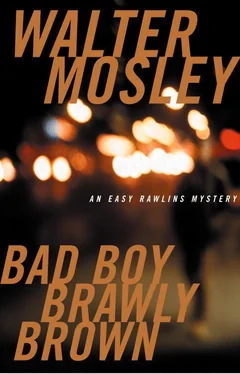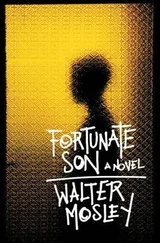“Hi,” I said.
“Who are you?”
“Easy,” I said. “Easy Rawlins.”
“What are you doing in my apartment?”
“Looking for Brawly Brown. The door was unlocked and I didn’t have anywhere else to be, so I walked in and called his name. I was just about to leave when you came in.”
“Why are you looking for Brawly?”
“Lotta people looking for him,” I said. “But I’m representing Alva, his mother.”
BobbiAnne checked the doorknob but there was no way to tell if it had been unlocked when I got there.
“I’ve looked everywhere,” I said, intending to calm her with conversation. “The First Men, at his cousin Isolda’s—”
“You here for her?” BobbiAnne said with a flash of anger.
“No. I just looked in at her. She’s the one who gave me your name.”
“That bitch,” BobbiAnne said.
“Why you say that?” I asked.
“Not a bitch but just sick,” the Nordic girl amended. She moved into the room, put at ease, I guess, because I stayed stationary.
“Sick how?”
“She used Brawly.”
“Yeah?”
“What are you going to do when you find Brawly?” she asked, changing the flow of the conversation.
I moved to a straight-backed wooden chair, indicating that I wanted to extend our conversation.
“The boy’s in trouble,” I said. “The police think he’s going to go ballistic with politics, Isolda thinks he might have killed his father, and Alva just thinks that he’s runnin’ with the wrong crowd. For all I know, they might all be right.”
Something I said got to the girl. A worried look invaded her optimistic features, and she took to the small sofa opposite me.
“Are you here to turn him over to the police?”
“I told you already that I’m here for his mother,” I said. “Mothers don’t turn their babies over to the cops.”
“How did you find me?”
“That’s the second time you changed the subject,” I said. “Not polite, but I’ll tell you that I wasn’t looking for you. I asked around about Brawly and heard that he had a girlfriend lived in this building. Once I saw your name, I knew it had to be you because Isolda told me that you were Brawly’s friend in high school. Now can you help me find the younger Mr. Brown?”
BobbiAnne had big, upstanding breasts and broad shoulders, crystal blue eyes and a stomach that protruded just slightly. All of this worked to make her more attractive as the moments went by. She was the kind of girl who would turn beautiful on you overnight.
Her face was worried, but still she didn’t seem fragile or vulnerable. I liked that.
“I don’t know where Brawly is,” she said. “But he’s not in any trouble that I know of. Nothing except that his mother doesn’t understand him.”
“Have you talked to him in the last day or so?”
“He called. He said that he was going to come by but first he had to see a... a friend.”
“Anton Breland?” I said, remembering the alias Conrad sometimes used.
“How do you know him?” For the first time Miss Terrell’s face showed real concern.
“Met him. He pulled out a pistol on me and left me stranded three miles away from my car.”
“Oh. I didn’t like him when I first met him,” she said. “But him and Brawly have gotten pretty close. For the past six months he’s really been getting into the black thing. He said that he realized that black people had to get the white man off their backs.”
“Is that when he left you?” I asked.
“What do you mean?”
“Well,” I said, “I didn’t see his name downstairs.”
“We never lived together.”
“So Brawly isn’t in any kind of trouble?” I asked.
“No,” she said in an uncertain tone.
“I can’t help him if you don’t tell me.”
“I don’t even know you.”
“The question is,” I said, “do you know Brawly?”
“What’s that supposed to mean?”
“It means that if the police come in here and find those guns up under your bed, they’re gonna drag you off to jail. Especially when they find those army-issue M-ones.”
“You searched my house?”
“Listen to me, girl,” I said. “I don’t care about you or those guns. I ain’t a cop and I don’t concern myself with politics. All I want is to figure out how Brawly is doing and get him outta trouble if I can. If you want to sleep with a thirty-year jail sentence up under your bed, it’s okay with me. But if you know what’s good for you, you’ll tell me how I can get to Brawly and talk some sense to him.”
“I don’t know anything, Mr. Rawlins,” she said.
“Are those his guns under your bed?”
She didn’t answer that question.
“What are they for?” I tried again
“Just... just for self-defense, just in case.”
“Have you touched them?” I asked.
“Touched what?”
“Those guns.”
“No.”
“Don’t,” I said, and then stood up.
BobbiAnne’s whole body jerked at my sudden movement. It was the first real evidence I had that she was afraid of me.
“Brawly’s in trouble,” I said. “And if you aren’t careful, he’ll drag you down with him.”
“I haven’t done anything wrong,” she said.
“If you can get a judge to believe that, you might only get fifteen years.”
Anton Breland was in the directory. I looked him up in a phone booth at the back of a Thrifty’s Drug Store. It was about two in the afternoon on a Monday. There could be no better evidence that I was losing my grip on the straight and narrow. As I sat there looking at the name in the white pages, I tried to convince myself that I had done my duty by John and it was time to go back to work. There was no reason for me to follow revolutionaries and murderers. Bonnie would be home in thirty-six hours. My life could be sweet once again.
But then I realized that in the past few days my waking hours had not been tinged with remorse about the death of my friend. Only my dreams revealed these feelings. As long as I moved forward trying to unravel the trail of Brawly Brown, I was in a kind of safety zone where guilt couldn’t touch me.
I lit up a cigarette and tore out the page.
Anton lived on Shenandoah, a small tributary off of Slauson, in a house that looked like a brick bunker. The lawn was neat but dead. The four-inch-high grass was straw colored. I imagined that Anton first lost interest in the lawn about fourteen or fifteen months before, but it continued to grow because it was the middle of the rainy season. With the coming of summer, the lawn died, leaving what looked like a pygmy wheat field.
The driveway was empty and there was no green Caddy to be seen anywhere, so I decided to wait in my car awhile.
The house in that field of dead grass looked to me like many abandoned structures I had come across on the outskirts of Berlin at the end of the war. Not important enough to bomb or burn but too dangerous to live in.
I lit up another cigarette and waited.
It was winter in Los Angeles, the only time of year that the smog let up. Winds came in from the desert and cleared the skies. That same wind made the clouds a panorama of ever changing sculptures suspended in a brilliant blue background. One moment there’d be a one-eyed lion, prowling out toward the mountains, then it would transform into a multi-armed anteater rearing up on its hind legs to display clawed limbs.
Those drifting giants made me smile. I was too small for them to notice, just a black dot beneath their domain. It gave me the illusion of safety.
When I saw Anton/Conrad’s green Cadillac drive up and him get out so nonchalantly, I realized that all safety is an illusion.
Conrad walked into the yard as if he were minor royalty living as well as could be expected among the poor. While he strolled toward his front door I considered my next move. Conrad had a gun and was reckless with it. He made decisions without regard for the security of his friends, bystanders, or even himself. I couldn’t just ring the bell; he might shoot me through the door. On the other hand, walking up to him also caused problems. He was fool enough to pull out a gun in broad daylight. I might have been able to disarm him, but then his neighbors might see our struggle and intervene.
Читать дальше












